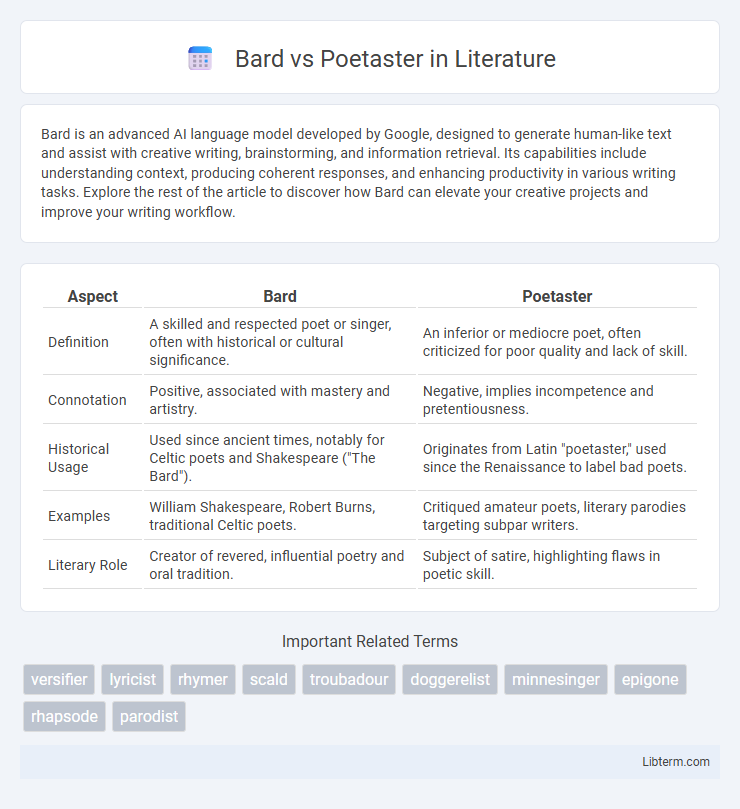Bard is an advanced AI language model developed by Google, designed to generate human-like text and assist with creative writing, brainstorming, and information retrieval. Its capabilities include understanding context, producing coherent responses, and enhancing productivity in various writing tasks. Explore the rest of the article to discover how Bard can elevate your creative projects and improve your writing workflow.
Table of Comparison
| Aspect | Bard | Poetaster |
|---|---|---|
| Definition | A skilled and respected poet or singer, often with historical or cultural significance. | An inferior or mediocre poet, often criticized for poor quality and lack of skill. |
| Connotation | Positive, associated with mastery and artistry. | Negative, implies incompetence and pretentiousness. |
| Historical Usage | Used since ancient times, notably for Celtic poets and Shakespeare ("The Bard"). | Originates from Latin "poetaster," used since the Renaissance to label bad poets. |
| Examples | William Shakespeare, Robert Burns, traditional Celtic poets. | Critiqued amateur poets, literary parodies targeting subpar writers. |
| Literary Role | Creator of revered, influential poetry and oral tradition. | Subject of satire, highlighting flaws in poetic skill. |
Understanding the Terms: Bard vs Poetaster
A bard is traditionally recognized as a skilled poet, often linked to ancient Celtic culture, who composes and performs epic or lyrical poetry with artistic mastery and cultural significance. In contrast, a poetaster refers to an inferior or mediocre poet whose work lacks skill, originality, and artistic value, often considered trivial or poorly crafted. Understanding these terms highlights the qualitative difference in poetic talent and the cultural esteem attributed to bards versus the dismissive connotation tied to poetasters.
Historical Origins of Bard and Poetaster
The historical origins of the bard trace back to ancient Celtic cultures, where bards served as revered oral historians, poets, and musicians preserving folklore and genealogies. In contrast, the term "poetaster" emerged in the late Renaissance period, coined by dramatists like Ben Jonson to derogatorily describe inferior or pretentious poets lacking genuine talent. While bards were esteemed cultural figures, poetsaters reflected a critical view of poor poetic craftsmanship in early modern literary history.
Key Characteristics of a Bard
A bard is a skilled storyteller and poet, often associated with ancient Celtic cultures, who preserves oral history and folklore through song and verse. Key characteristics of a bard include mastery of poetic forms, musical talent, and a role as a cultural historian or entertainer within their community. Unlike a poetaster, who produces inferior or trivial poetry, a bard commands respect for their artistic skill and ability to inspire and educate.
Defining Traits of a Poetaster
A poetaster is characterized by poor poetic quality, marked by awkward rhyme schemes, banal themes, and a lack of originality or depth. Unlike a bard, who excels in storytelling, lyrical creativity, and cultural significance, a poetaster produces verses that are often derivative and lack artistic merit. This distinction underscores the poetaster's role as an inferior or ineffective poet within literary discourse.
Bardic Tradition in Literature
Bardic tradition in literature emphasizes the oral transmission of epic tales, heroic feats, and cultural history, often embodying the collective memory of a community through song and poetry. A bard is revered as a skilled storyteller and cultural custodian who elevates language to an art form, while a poetaster is typically seen as a lesser poet who lacks genuine craftsmanship and depth. This distinction underscores the bard's role in preserving heritage and inspiring audiences, contrasting with the poetaster's often superficial or derivative creations.
The Rise and Pitfalls of Poetasters
The rise of poetasters reflects a surge in amateur poets producing oversimplified and often poorly crafted verse, diluting the literary quality traditionally upheld by bards renowned for their skill and cultural influence. Poetasters frequently face criticism for their lack of originality and depth, leading to a perception of their work as superficial or derivative, which can undermine their credibility and reputation in literary circles. This proliferation challenges the distinct artistry of bards, highlighting the pitfalls of valuing quantity over quality in poetic creation and the importance of mastering language and form.
Bard vs Poetaster: Artistic Intent and Impact
Bard epitomizes artistic mastery with profound cultural impact, often celebrated for authentic and inspired poetic expression, while a poetaster is characterized by inferior craftsmanship and lack of genuine creative intent. The bard's work typically resonates deeply, influencing literature and society, whereas the poetaster's output is frequently dismissed for its mediocrity and superficiality. This contrast highlights the importance of intentional artistry and meaningful contribution in defining poetic value.
Modern Perceptions: Relevance Today
Modern perceptions of bard versus poetaster emphasize the enduring cultural value of genuine poetic artistry compared to the negative view of inferior or pretentious verse. Contemporary literary criticism often distinguishes bards as authentic creators whose work resonates deeply across time, while poetasters are seen as producing superficial or derivative content lacking true creative merit. The relevance today lies in recognizing the distinction between meaningful poetic contributions that influence culture and trivial works that fail to inspire lasting impact.
Famous Bards and Notorious Poetasters
Famous bards like William Shakespeare and Robert Burns are celebrated for their profound impact on literature, weaving timeless themes with masterful language that shaped cultural heritage. Notorious poetasters, such as Lord Byron's lesser-known rivals, produced work often criticized for lacking depth and originality, highlighting the stark contrast in literary quality and influence. The enduring legacy of bards versus the fleeting notoriety of poetasters underscores the importance of genuine artistry and innovation in poetry.
How to Distinguish a Bard from a Poetaster
A bard is recognized for their mastery in crafting profound, culturally significant poetry and songs that elevate heroic themes, whereas a poetaster produces inferior, often trivial and derivative verse lacking depth and originality. The quality of imagery, emotional resonance, and linguistic skill sharply differentiate a bard's celebrated works from a poetaster's substandard creations. Historical bards like Taliesin are revered for their oral storytelling prowess, while poetasters are criticized for superficial imitation rather than genuine artistry.
Bard Infographic

 libterm.com
libterm.com